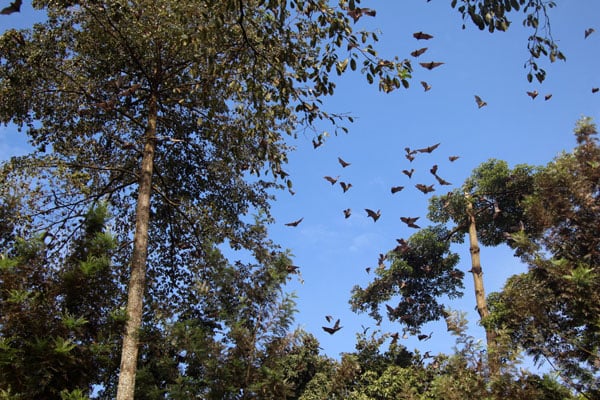Panic as bats invade Lugazi

This photo taken on October 29, 2020 shows bats on some trees in Lugazi town, Buikwe District. PHOTO. DERICK KISSA
What you need to know:
Some facts about bats, according to nature.org;
- Bats can live more than 30 years and can fly at speeds of up to 60 mph.
- Bats can find their food in total darkness.
- Bats can eat up to 1,200 mosquitoes an hour..
Residents of Lugazi municipality in Buikwe District are concerned over the increasing number of bats that have invaded their area and asked government to intervene.
They say a large colony of bats invaded their town early this week causing panic.
Mr Micheal Ngobi, a boda boda rider in Lugazi town said they are not settled because they cannot tell whether the mammals are dangerous or not.
“We are so much worried because these bats are so many and we do not know what next. We call upon the concerned people to help us as soon as possible,” he said.
Mr Steven Mugoya, councilor for Kikawula Village in Lugazi municipality appealed to government for intervention.
“I have never seen as many bats as these ones. We request the government to intervene because we are so much worried. The situation may worsen and the government may end up spending a lot of money like they did on the locusts,” Mr Mugoye said.
Dr James Kabanda, a veterinary doctor in Lugazi municipality said that bats are not so harmful to human being unless someone gets in contact with a sick or infected bat which has bacteria.
“These bats help human beings because they feed on mosquitoes which are malaria causing insects. However, I appeal to the public not to get in contact with a dead or fallen bat because they always have bacteria which may cause different infections to the human. We will spray them so that they can migrate to another place because they are making our town dirty,” Mr Kabanda said.
Seven facts about bats, according to nature.org;
- Bats can live more than 30 years and can fly at speeds of up to 60 mph.
- Bats can find their food in total darkness.
- Bats can eat up to 1,200 mosquitoes an hour.
- More than half of the bat species in the United States are in severe decline or listed as endangered.
- Most bats have only one pup a year, making them extremely vulnerable to extinction.
- Bat droppings, called guano, are one of the richest fertilizers.
- The world’s largest bat is the "flying fox" that lives on islands in the South Pacific.




